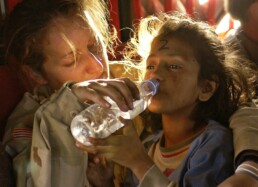Immigration Canada Reaffirms Commitment to Resettling Yazidi Refugees in the Face of Recent Setbacks to Humanitarian Groups
Helping Yazidi refugees resettle in Canada within the next month is at the forefront of the country’s immigration efforts despite recent obstacles. Refugee law offices have been working closely with immigration officials in Canada to help resettle these people.
Despite the Government of Canada’s recognition of the urgent situation many Yazidi people find themselves in, obstacles continue to slow or stop the resettlement process.
The Yazidi are victims of violence and genocide in northern Iraq. The four-month resettlement deadline set by the Canadian government is fast approaching. The recent closure of a key Iraqi humanitarian partner has added further urgency to the situation.
Yazada, the humanitarian group that had been helping Canada with the refugee screening process, was recently shut down by the local Iraqi government. This political closure has called into question if Canada can actually help the Yazidi refugees.
The often-complex screening and resettlement process continues in the face of such closures, however. Canada remains a committed leader in the global refugee crisis and a safe haven for many displaced victims of violence.
The Yazidi Genocide
In 2014, ISIS began attacks against the Yazidi minority group of northern Iraq. Last June, the United Nations reported that the Yazidi community, an estimated 400,000 people, were targeted by ISIS with the aim to destroy the minority group by erasing their identity. Mass murders, torture, rape, and displacement characterize the brutal (and repeated) attacks against the Yazidis.
CBC News recently reported on Canada’s commitment to helping Yazidi refugees and provided details of the horrific violence that these people have suffered. The Sinjar Massacre is one such incident, where ISIS soldiers killed 4,000, kidnapped 6,000, and displaced another 4,000. To date, most of the Yazidi people who were kidnapped are women and girls held captive as sex slaves, where they are sold and often raped (and, in some cases, tortured) on a daily basis.
Canada’s Commitment to Helping Yazidi Refugees
In October 2016, there was a vote in the House of Commons to bring Yazidi refugees to Canada within a four-month period. All Members of Parliament voted in favour of this resettlement and a February 22, 2017 (120 days) deadline was established.
Part of this motion, tabled by Conservative Party MP Michelle Rempel, was to recognize that the Yazidi people were facing genocide at the hands of ISIS and that ISIS continues to hold captive many Yazidi women and girls as sex slaves. These victims and their families are the top priority for Canada’s resettlement commitment, yet the screening process for Yazidi refugees is faced with many obstacles.
Yazda
More recently, the humanitarian group that was helping Yazidi refugees and Canada immigration officials in the refugee screening process has been shut down by the Kurdistan Regional Government for “engaging in political activities.”
Yazda is a non-governmental organization that helps Yazidi survivors of abuse, torture, and sexual slavery—providing support to more than 600 women and girl survivors with health care and therapy. This humanitarian group was a key partner for helping the Canadian government resettle Yazidi refugees, and its closure may pose a threat to Canada’s four-month deadline.
Although Yazda may be able to continue operations in the future, there is uncertainty over if and when this will happen. Despite the possibility that Yazda may not be able to continue its partnership with Canada, Yazda’s executive director, Murad Ismael, stated that there are other NGOs and partners who are ready to help Canada with the Yazidi immigration process.
A spokesperson for Immigration, Refugees and Citizenship Canada also confirmed that Canada will continue working to meet its commitment to Yazidi refugees despite the recent closure of Yazda. The urgency to help Yazidi refugees is still at the forefront of Canada’s immigration efforts and is a significant driving factor. These survivors need help from other countries to escape persecution, find safe homes, and receive physical and emotional care.
There is hope that Canadian government will be able to continue its efforts to bring the Yazidi refugees to Canada as quickly as possible, and provide them with the medical care, therapy, and social support needed to resettle and recover from the horrific violence they have experienced.
Share this article
Arghavan Gerami
Arghavan Gerami is the Founder and Senior Counsel at Gerami Law Professional Corporation ('PC'), a full-service immigration law firm in Ottawa, Ontario. Since 2011, Ms. Gerami has focused her practice on immigration and refugee litigation. Prior to that, Ms. Gerami worked at the Ministry of Attorney General and the Department of Justice and had the privilege of serving the Honourable Mr. Justice M. Evans at the Federal Court of Appeal on immigration and administrative law appeals. Ms. Gerami contributes to the Immigration Law Section of the Canadian Bar Association, the Canadian Association of Refugee Lawyers, and the United Nations High Commissioner for Refugees. Ms. Gerami has also published numerous journal articles and presented at various immigration and refugee law conferences and events across Canada.

